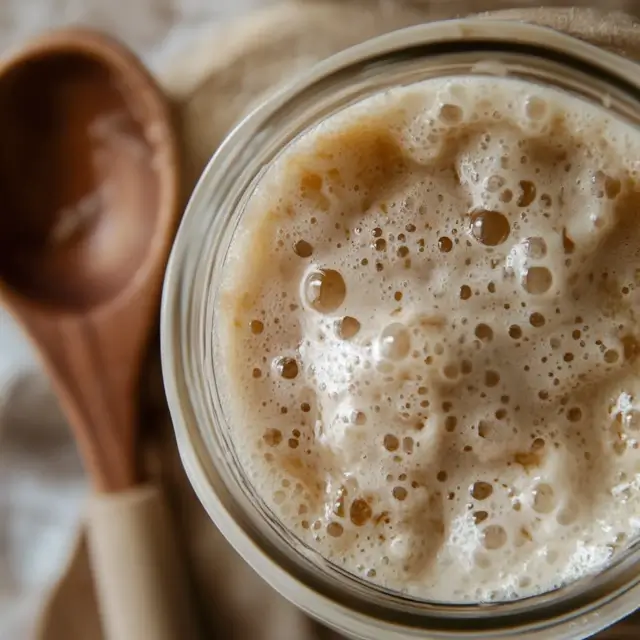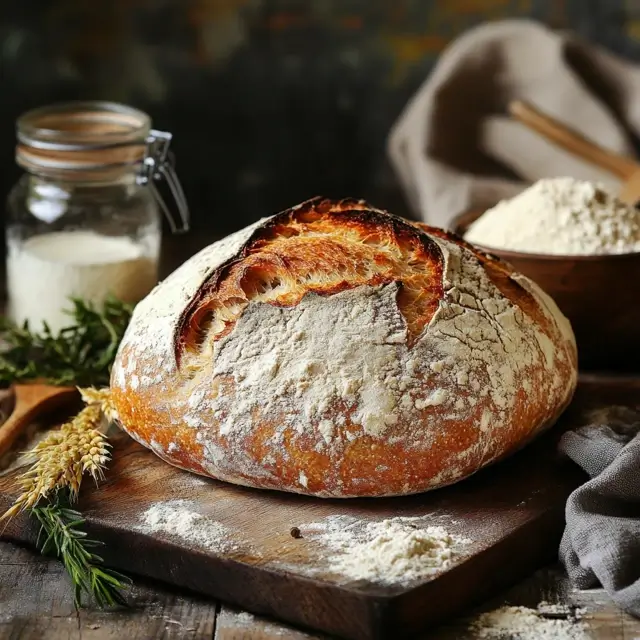Table of Contents
If you’ve ever wondered, “Why is sourdough bread not fattening?” you’re not alone. This deliciously tangy bread has been hailed as one of the healthiest bread options on the market. But what makes it so special? Unlike conventional bread, sourdough isn’t just about the flavor—it’s about how your body processes it. Let’s dig into the fascinating reasons sourdough bread stands out in a world full of carb-filled temptations.
What Makes Sourdough Bread Unique?
Sourdough bread is anything but ordinary. Its distinct qualities come from the fermentation process, which involves a mix of wild yeast and bacteria that break down the dough’s sugars.
- Fermentation Process: This slow and natural process pre-digests some of the starches, making it easier for your body to digest.
- Natural Leavening Agent: Unlike commercially baked bread that uses instant yeast, sourdough relies on wild yeast, contributing to its lower glycemic index.
- Rich Flavor Profile: The tangy taste isn’t just delicious; it’s a sign of its health-promoting acids.
Brief History of Sourdough Bread
Sourdough dates back thousands of years and was a staple long before commercial yeast was invented. The ancient Egyptians were among the first to use this method. Over time, sourdough became a cherished tradition, valued not just for its flavor but also for its longevity and nutrition.
Understanding “Not Fattening”
To understand why sourdough bread isn’t fattening, it’s essential to break down the factors that influence weight gain.
1-Calories vs. Nutritional Value
Calories in food aren’t the only thing that matters; nutrient density does, too.
- Lower Calorie Content: Compared to other bread types, sourdough tends to be slightly lower in calories due to the fermentation process.
- Packed with Nutrients: It’s rich in minerals like magnesium, potassium, and zinc, which support overall health.
2-Digestion and Gut Health Benefits
Ever heard the phrase, “It’s not just what you eat but how you digest it?” Sourdough takes this to heart.
- Pre-Digested Starches: The fermentation process breaks down starches, meaning your body doesn’t need to work as hard.
- Probiotic Benefits: The bacteria in sourdough can promote healthy gut flora, aiding digestion and improving metabolism.
The Science Behind Sourdough
When you bite into a slice of sourdough, there’s more happening than meets the eye (or taste buds).
1-Role of Fermentation in Health

Fermentation is the star player. During this process:
- Lactic Acid Production: This creates an acidic environment, which can help control blood sugar levels.
- Reduction of Antinutrients: It lowers compounds like phytic acid, improving mineral absorption.
2-Lower Glycemic Index: A Hidden Perk
Unlike white bread, which causes blood sugar spikes, sourdough releases sugar into your bloodstream more slowly, thanks to its low glycemic index. This means:
- Stable Energy Levels: No mid-afternoon crashes.
- Better Weight Management: Reduced likelihood of storing extra sugar as fat.
Comparing Sourdough to Other Breads
Not all bread is created equal. Let’s see how sourdough stacks up.
1-White Bread vs. Sourdough
- White Bread: Quickly digested and high in simple carbs, leading to rapid blood sugar spikes.
- Sourdough: Slowly digested, supporting sustained energy levels and better digestion.
2-Whole Grain Bread vs. Sourdough
- Whole Grain Bread: High in fiber but may still contain antinutrients that block mineral absorption.
- Sourdough: Combines the fiber of whole grains (if made with whole wheat) with enhanced bioavailability of nutrients.
3-Gluten Sensitivity and Sourdough
For those with mild gluten sensitivity, sourdough can be easier to digest because fermentation breaks down some of the gluten proteins.
Common Myths About Sourdough
Let’s address some misconceptions.
1-Does It Really Help With Weight Loss?
Sourdough isn’t a magic weight-loss food, but its health benefits make it easier to maintain a balanced diet.
2-Is It Completely Guilt-Free?
It’s still bread, so portion control matters. But compared to other options, sourdough is undeniably a smarter choice.
Practical Tips for Choosing Sourdough
Shopping for sourdough isn’t as straightforward as it seems. Here’s how to pick the real deal.
1-Identifying Authentic Sourdough
- Check Ingredients: True sourdough has minimal ingredients: flour, water, salt, and starter.
- Look for Long Fermentation: Avoid “sourdough-flavored” bread made with commercial yeast.
2-Best Practices for Storing and Eating
- Storage: Keep it in a paper bag for the best texture.
- Serving: Pair with healthy toppings like avocado or almond butter for a balanced snack.
Homemade Sourdough Bread: Worth It?

For those who love a DIY challenge, making sourdough at home can be a rewarding experience.
1-The Basics of Baking Sourdough
- Ingredients: All you need is flour, water, salt, and a starter.
- Time Commitment: Be prepared for a long fermentation process, but the results are worth it!
2-Cost vs. Health Benefits
While sourdough may seem more expensive than regular bread, its nutritional and digestive benefits make it a worthwhile investment.
Frequently Asked Questions (FAQs)
1-Does sourdough cause weight gain?
No, sourdough is less likely to cause weight gain because of its lower glycemic index and easier digestibility.
2-How often should you eat sourdough?
Enjoy sourdough a few times a week as part of a balanced diet. It’s filling, so you may find you need smaller portions.
3-Can sourdough be part of keto diets?
Traditional sourdough isn’t keto-friendly, but low-carb versions are available.
The Science of Why Sourdough Bread Isn’t Fattening
Sourdough bread is a fascinating example of how natural processes, like fermentation, can enhance the nutritional profile of food. But why exactly does sourdough bread stand out compared to other breads when it comes to weight management? Let’s break it down further.
1. Fermentation: The Game-Changer
The fermentation process is at the heart of sourdough bread’s uniqueness. During fermentation, the wild yeast and lactobacilli bacteria interact with the flour and water to create a live, bubbling starter. But what does this mean for your waistline?
- Breaking Down Carbs Naturally: The fermentation process breaks down a significant portion of the bread’s carbohydrates into simpler sugars, making it easier for your body to digest without overwhelming your system with glucose.
- Acidity Helps Control Blood Sugar Spikes: Lactic acid produced during fermentation lowers the bread’s pH, which slows down carbohydrate digestion. This leads to a more gradual release of sugar into your bloodstream—essential for weight control.
- Reduced Need for Insulin: Because of its low glycemic index, sourdough bread doesn’t cause the sharp insulin spikes that can lead to fat storage over time.
Block Quote: “Think of fermentation as the bread doing part of the digestion for you, making it easier on your body and less likely to store calories as fat.”
2. Better Nutrient Absorption
One common issue with many types of bread is the presence of antinutrients like phytic acid, which can block your body from absorbing essential minerals such as calcium, magnesium, and zinc. However, sourdough’s fermentation process reduces these antinutrients significantly. This means that when you eat sourdough, your body can actually absorb more of the good stuff, boosting overall health and aiding weight management.
- Minerals Matter for Metabolism: Zinc and magnesium, abundant in sourdough, play key roles in regulating metabolism and burning fat efficiently.
- Enzyme Activity: Fermentation also activates enzymes that make digestion smoother and nutrients more bioavailable.
3. Lower Caloric Density
One little-known fact about sourdough bread is that it tends to have slightly fewer calories per slice compared to conventional breads. This is due to:
- Water Content: Sourdough often has a higher water retention rate, making each bite less calorie-dense.
- Airy Structure: The long fermentation process creates a light, airy crumb that can make the bread more filling without being packed with calories.
Block Quote: “Sourdough may look hearty, but its airy texture means fewer calories per slice—guilt-free satisfaction!”
Health Benefits That Go Beyond Weight
It’s not just about avoiding weight gain. Sourdough bread offers several health benefits that make it a fantastic addition to your diet.
1-Improved Digestion
If you’ve ever felt bloated after eating bread, sourdough might be the answer. Its pre-digested starches and probiotics make it much easier on your stomach.
- Reduced Bloating: The lactobacilli bacteria in sourdough help reduce gas and bloating by breaking down hard-to-digest components before you eat them.
- Gut Health Booster: Sourdough’s natural probiotics encourage a balanced gut microbiome, which is linked to everything from better digestion to improved mental health.
2-Sustained Energy Levels
Thanks to its slow-digesting carbohydrates and lower glycemic index, sourdough provides long-lasting energy without the mid-afternoon crash that refined breads often cause.
How to Make Sourdough Work for Your Diet
Even with its health benefits, the way you incorporate sourdough into your diet matters. Here are some practical tips:
1. Portion Control
- While sourdough is healthier, it’s still bread, so keep portions reasonable. A slice or two per meal is ideal.
2. Pair It with Nutrient-Dense Foods
- Add healthy toppings like avocado, hummus, or nut butter to make your meal more balanced and filling.
3. Go for Whole Grain Sourdough
- Opt for whole-grain sourdough whenever possible, as it contains more fiber, which further supports digestion and weight management.
The Cultural Love for Sourdough
Sourdough bread has gained global popularity, not just for its health benefits but also for its artisanal appeal. From French boulangeries to American home kitchens, sourdough is celebrated for its versatility and timeless charm. Its resurgence in popularity during the pandemic highlighted its therapeutic value—baking sourdough became a way to de-stress and connect with age-old traditions.
Frequently Asked Questions (Extended)
1. Can sourdough bread help reduce belly fat?
While sourdough itself doesn’t target fat loss in specific areas, its low glycemic index and probiotic content can support better digestion and overall weight management, which may help reduce belly fat over time.
2. Is sourdough good for diabetics?
Yes, sourdough’s lower glycemic index makes it a smarter choice for diabetics. It causes smaller blood sugar spikes compared to regular bread.
3. Why does sourdough feel more satisfying than other breads?
Its combination of complex carbs, protein, and probiotics creates a fuller feeling, reducing the urge to snack.
4. Can sourdough replace other breads entirely?
It depends on your preferences and nutritional needs, but sourdough is a versatile option that can easily replace less nutritious breads in most recipes.
5. How do I know if I’m buying authentic sourdough?
Authentic sourdough has a simple ingredient list: flour, water, salt, and starter. Avoid products labeled “sourdough-flavored,” as they may contain commercial yeast and additives.
Why You Should Start Eating Sourdough Today?
If you’re looking for a delicious bread option that aligns with your health goals, sourdough is a no-brainer. Its natural fermentation process, lower calorie content, and digestion-friendly properties make it a winner on every level. Whether you enjoy it as toast in the morning or a hearty sandwich at lunch, sourdough bread proves that you don’t have to sacrifice taste for health.
Conclusion: Why Sourdough Stands Out
Sourdough bread isn’t just another carb—it’s a nutritional powerhouse with a tangy twist. Its fermentation process, lower glycemic index, and gut-friendly properties make it an excellent choice for anyone looking to enjoy bread without the guilt. Whether you buy it from a trusted bakery or bake it yourself, sourdough is proof that not all bread is created equal.
Banana Bread Recipe: 5 Game-Changing Secrets for the Best Flavor! – Since banana bread is a popular type of quick bread, this article can provide a contrasting perspective to sourdough for readers interested in different types of homemade bread.

